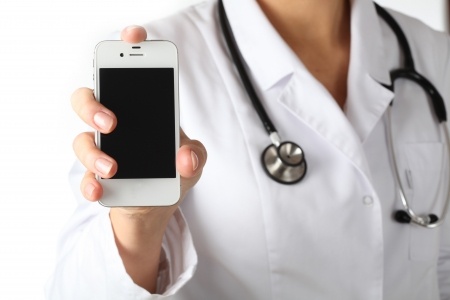Posted on
Smartphones in Healthcare Environments – Recognising Mobile Innovation in The Workplace
The use of Smart Phones (generally) has grown significantly over the last two years amongst business people and more impressively amongst the normal day to day person. From a recent survey by E-Marketer –there are some statistics to sit up and take notice of and compare where Smart Phone use is fast over taking the good old Nokia Brick:
|
Number of people using Smart Phones |
As a % of mobile phone users |
Represented as a % of the UK population |
|
| 2011 |
21.6 million |
44.1% |
34.3% |
| 2012 |
26.4 million |
52.5% |
41.7% |
| 2013 |
30.9 million |
60.4% |
48.4% |
| 2017 – projected |
43.4 million |
80.9% |
65.8% |
They predict that by 2014 – two out of three mobile phone users and 53.7% of the population will be using Smart phones, and by 2017 this will grow to be 81% of mobile users.
Those are some staggering figures to look at and a big bolt of lightning should be hitting businesses as to how this tide of technology will affect their work places – especially from the standpoint of personalising and tailoring the customer experience.
The use of personal phones in the work place has long been a subject of debate between employers and employees alike in the past. At Daniels we feel that if there is one thing that technology and the evolution of social media has taught us over the last 12 months, it is that: it is becoming increasingly difficult to dictate what is “personal” and what is “business” when it comes to Smart Phones and the working day.
 What does the increased use of Smart Phones mean?
What does the increased use of Smart Phones mean?
As a business we are always reviewing how we communicate with our customers that best fits how they want to communicate with us and part of that is in understanding the use of mobile technology. Smart Phones mean that our customers can Tweet us, email us, call us, or post a query on our Facebook page at any point of the day – and are no longer restricted to using desk based PCs.
Another clear advantage of the increased use of Smartphones is the ability to tap into the quick and responsive aspect of Apps…
Barking, Havering and Redbridge Teaching Hospitals Trust (BHRUT) upgraded their emergency response systems to include the Responder Smartphone Application which helps them to better manage the 700,000 citizens it serves.
In an article for New Electronics, a site for electrical engineers, Sebastien Mussalian, a senior engineering consultant at a Cambridge based design consultancy specialising in medical devices says the potential to cuts costs is a key driver for several parts of the healthcare apps market. Specifically he says that “The UK’s NHS needs to cut costs as do most other developed countries. Mobile healthcare apps can do that by providing remote monitoring, tracking and other forms of assistance for people in their own home. This can eliminate the need for carers to perform as many home visits, with major cost saving potential.” (While this could be misunderstood for making staff redundant it is about utilising staff in other areas, possibly making the healthcare environment more efficient.)
Apps designed and built for use within the healthcare sector – either by health professionals themselves or for their patients is a growing market. As a small indication ABI Research estimates that the market for mobile healthcare apps in the USA will be worth $400million by 2016, while the market research company Research2Guidance claims 247million mobile phone users downloaded a health related app in the US in 2012.
In order to stay at the forefront of our customers and their needs at the point of use of our containers and products, we have developed an App for our customers to use which we will be sharing more with you in the coming weeks.
What is your experience of Smart Phones in your workplace?
We’re interested to hear what your experiences are with Smart Phones in your office or work environment. Do you find that you use your personal mobile phone more at work or not? How would you describe the change that Smart Phones has brought to you, your colleagues or even your family? Let us know in the comments below…
Image courtesy of: bialasiewicz / 123RF Stock Photo


